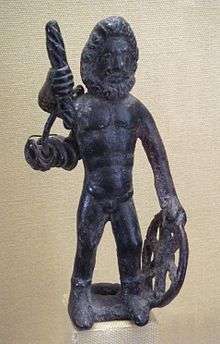Suleviae
In ancient Celtic religion, Sulevia was a goddess worshipped in Gaul, Britain, and Galicia,[1] very often in the plural forms Suleviae or (dative) Sule(v)is. Dedications to Sulevia(e) are attested in about forty inscriptions, distributed quite widely in the Celtic world, but with particular concentrations in Noricum, among the Helvetii, along the Rhine, and also in Rome. Jufer and Luginbühl distinguish the Suleviae from another group of plural Celtic goddesses, the Matres, and interpret the name Suleviae as meaning "those who govern well".[2] The Suleviae have been identified in one inscription with the Junones, but mostly with the Matres, for example on an inscription from Roman Colchester, as well as on most of the inscriptions from Rome. The Colchester inscription reads:
- MATRIBVS SVLEVIS SIMILIS ATTI F CI CANT VSLM
- (Translated: To the Sulevi mothers, Similis the son of Attius, of the Civitas Cantiacorum, willingly and deservedly fulfills his vow.)[3]
Van Andringa interprets the Suleviae as "native domestic divinities honoured at all social levels".[4] For the theory that the Suleviae were a triune version of Sulis Minerva, see Sulis. This theory is disputed by some researchers who find no direct links with Sulis, and suggest instead that the similarity in names is coincidental.[2] Another theory connects the Suleviae with the Xulsigiae, known from a site at Trier;[5] but this suggestion has also been contested.
See also
References
- ↑ Votive inscription to SULEIS NANTUGAICIS, found in Paderne de Allariz. Cf. Luján Martínez, Eugenio R. (3 May 2006). "The Language(s) of the Callaeci" (PDF). e-Keltoi. 6: 722. Retrieved 17 May 2012.
- 1 2 Nicole Jufer & Thierry Luginbühl (2001). Les dieux gaulois : répertoire des noms de divinités celtiques connus par l'épigraphie, les textes antiques et la toponymie. Editions Errance, Paris. pp.15,64. In the original: "Celles qui gouvernent bien".
- ↑ http://www.roman-britain.org/places/camulodunum.htm retrieved 21/07/2014
- ↑ William van Andringa (2002). La religion en Gaule romaine: piété et politique (Ier-IIIe siècle apr. J.-C. Editions Errance, Paris ISBN 2877722287 p. 275. In the original: "divinités domestiques indigènes honorés dans tous les milieux sociaux".
- ↑ Edith Mary Wightman (1970). Roman Trier and the Treveri. Rupert Hart-Davis, London.

